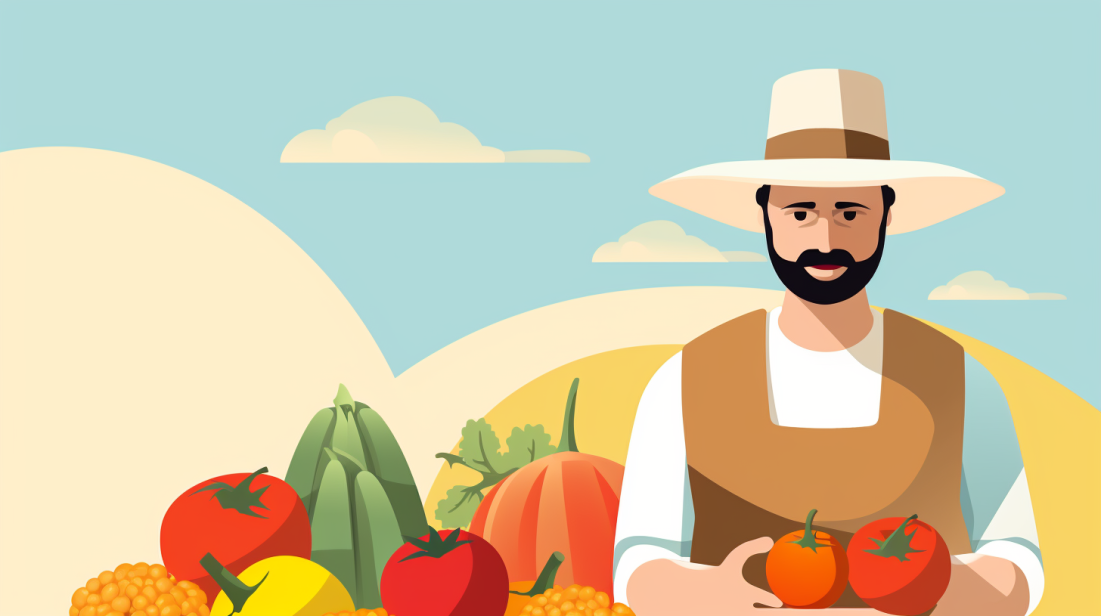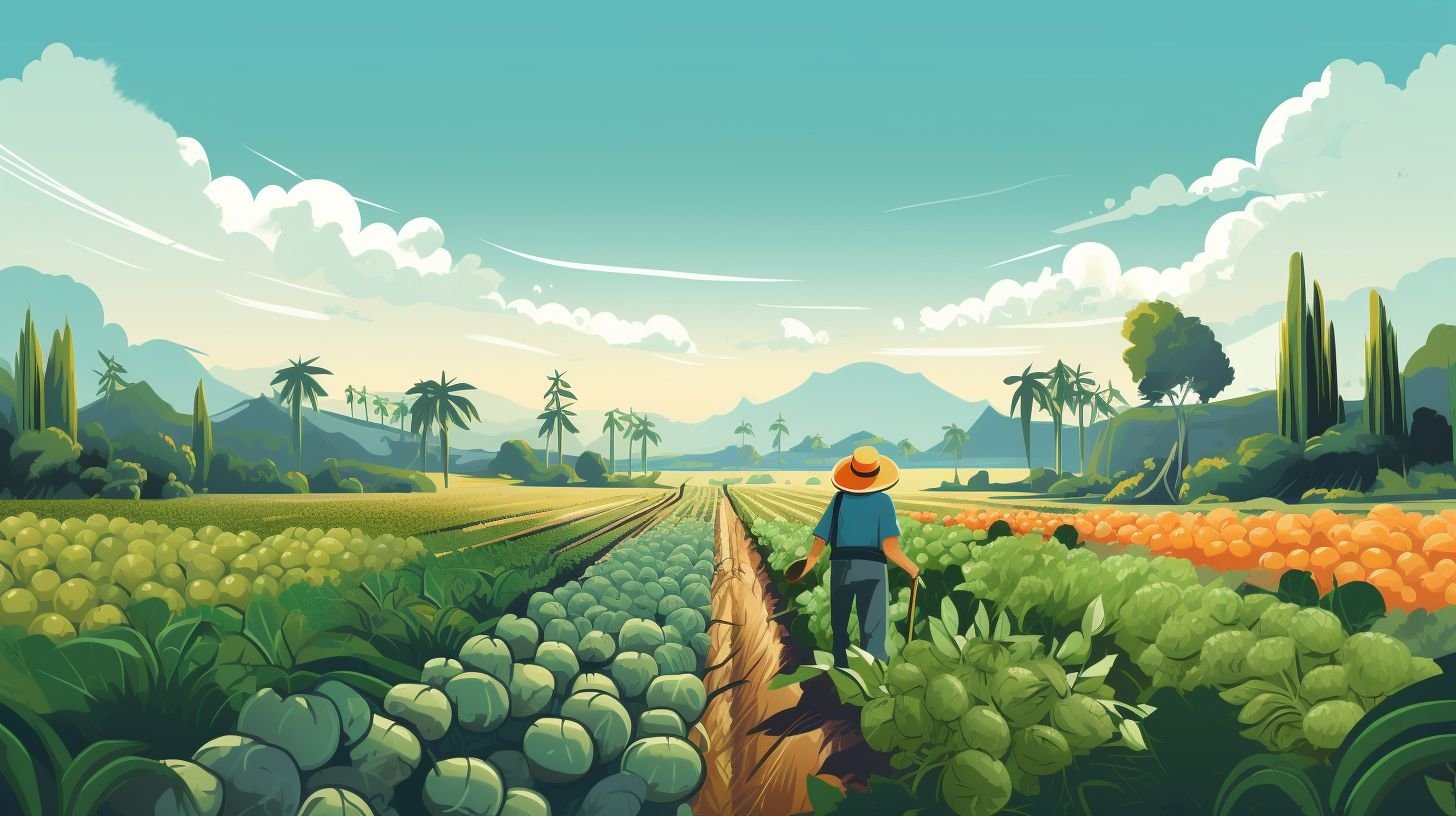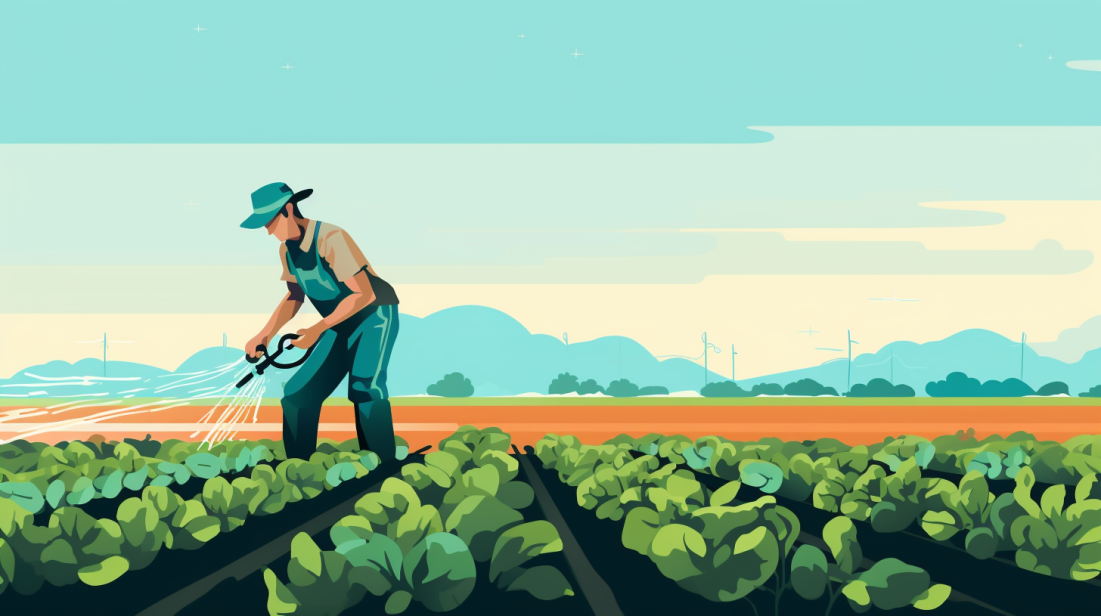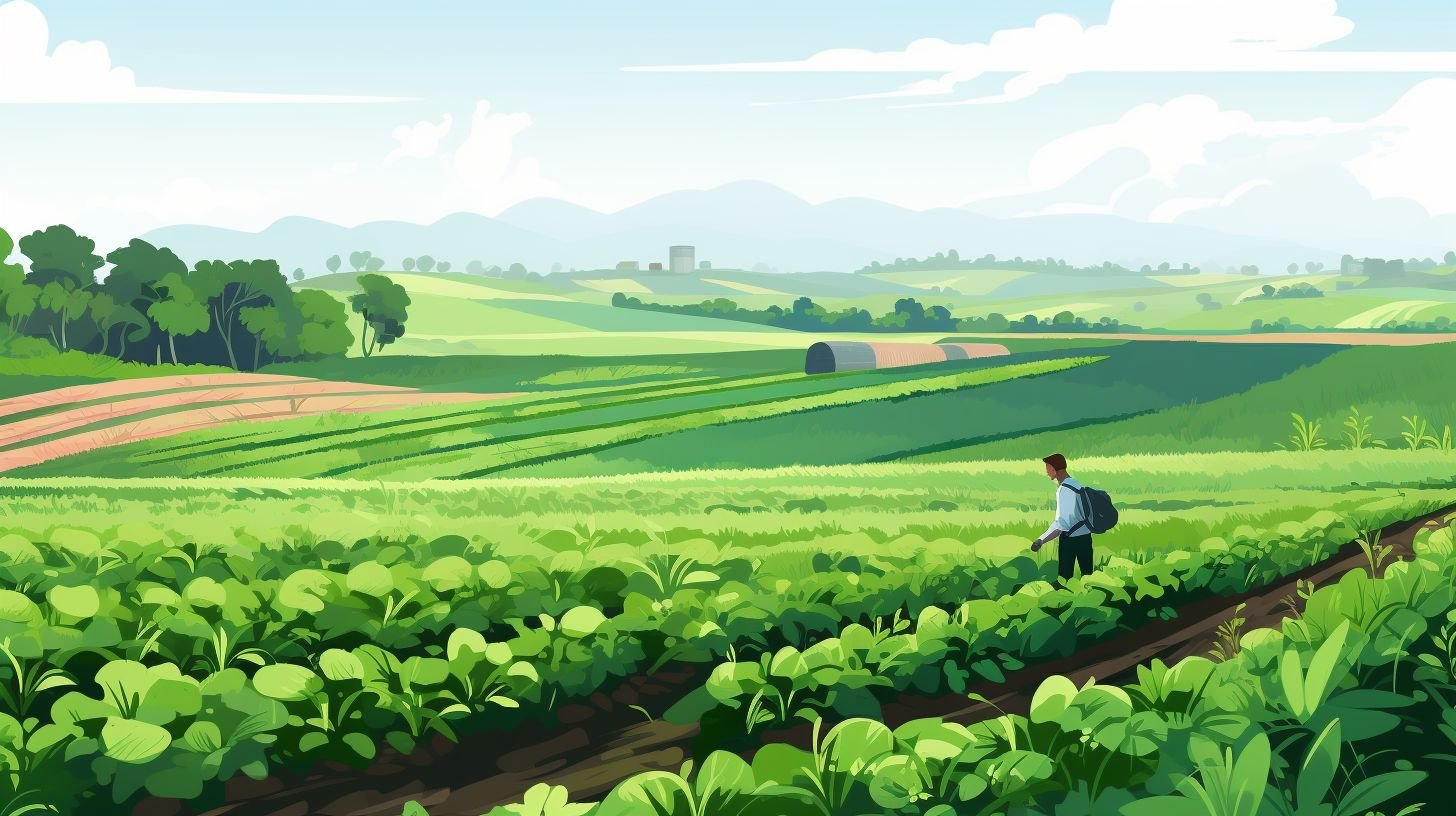Sustainable Ways to Make Money with Organic Farming

Struggling to turn a profit from your organic farming endeavors? Trust me, you’re not alone. Fascinating figures reveal that organic agriculture has the power to sequester up to 3500 pounds of CO2 per acre each year, hinting at an incredible potential waiting to be tapped into.
This blog is set out on a mission to shine a light on sustainable practices in organic farming — ones that could transform your venture into something that’s beneficial for our planet and profitable for you as well.
Are you eager to unearth how Mother Nature can nurture both your spirit and your financial growth?.
Key Takeaways
- Organic farming uses natural methods and avoids synthetic chemicals to produce crops and livestock, benefiting the environment and our health.
- Sustainable practices like using organic fertilizers, optimizing crop growth conditions, practicing crop rotation, and managing weeds efficiently can maximize profits in organic farming.
- Organic farming offers lower up – front investment costs, higher profit margins due to premium prices for organic products, and no harmful emissions compared to conventional agriculture.
- Supporting pollinators, reducing tilling of soil, rotating crops, and using efficient irrigation are important tips for successful organic farming.
Understanding Organic Farming
Organic farming is a sustainable agricultural practice that focuses on using natural methods and avoiding synthetic chemicals to produce crops and livestock.
Principles and Practices
Organic farming follows key rules. Good soil health is a big part of it. We use compost, crop waste, and animal droppings to enrich the soil in our fields. This makes our plants strong and healthy.
Crop rotation also helps keep the soil full of nutrients. By changing what we plant each time, it stops one type of plant from eating up all of one nutrient in the soil. With pest control, we don’t rely on harsh chemicals as traditional farming does – instead, we invite insects like ladybugs to eat harmful pests such as aphids or mites which can ruin crops if left unchecked.
Instead of using artificial feeds for chickens or cows on an organic farm, they are fed natural foods and have plenty of space to roam around making them happier and healthier overall too.
The weather plays a big role in organic farming too. Planting at just the right time within optimal temperature ranges ensures good growth.
Benefits of Organic Farming
Organic farming is good for our earth. It helps keep air and water clean, while also making land strong. Organic farmers use methods like crop rotation. This makes the soil rich with nutrients.
Healthy soil grows better crops and stops plant diseases.
Another plus of organic farming is that it fights climate change by keeping carbon in the soil not in the air. Using nature-friendly ways to grow food supports bees, birds and other wildlife too.
Farming this way can provide more jobs for people and boost local economies.
Certification and Standards
Getting certified is a vital step in organic farming. You have to follow strict rules for your farm to earn this badge. These rules come from the International organic standards. They guide farmers on how to grow food without using harmful chemicals.
Farmers who stick to these standards make sure there’s no harm done to our health and environment. Plus, people trust certified organic farms more!
Sustainable Methods of Organic Farming

Organic farming employs several sustainable methods to ensure the health of crops and the environment.
Organic Fertilizer Use
Organic fertilizer is a big part of my farm work. It means using stuff like compost, manure, and cover crops. These are good for the soil. They give food to the crops in a way that’s balanced and can last a long time.
This way of farming stops dirt from being washed away by rain or wind. It keeps water clean and does not harm our world with bad chemicals. It also traps 3500 pounds of CO2 for every acre each year! Using organic fertilizer makes the soil, plants, bugs, birds–all parts of nature–healthy and full of life.
My yields go up because my crops are healthier and I spend less on buying chemical fertilizers.
Optimal Timing & Temperatures for Crop Growth
To ensure successful organic farming, it’s important to consider the optimal timing and temperatures for crop growth. This helps maximize plant growth and overall yield. Here are some key factors to keep in mind:
- Planting Times: Plant your crops at the right time of year when soil temperatures are suitable for germination. This can vary depending on the specific crop.
- Germination: Different crops have different germination temperature requirements. Make sure to provide the ideal temperature range for seeds to sprout and grow.
- Spring Frost Date: Be aware of the last expected spring frost date in your area. Planting too early can expose seedlings to frost damage, while planting too late may result in a shorter growing season.
- Crop Yield: Consider the desired crop yield and plan your planting times accordingly. Some crops require longer growing seasons, so adjust planting times accordingly.
- Crop Residues: Clear crop residues from previous plantings before starting new ones. This helps prevent disease transmission and promotes healthy growth.
- Optimal timing & temperatures for crop growth (Facts 1, 5)
Crop Rotation
Crop rotation is a key practice in organic farming. It helps to maintain soil health and fertility by alternating different crops in a specific sequence over time. By rotating crops, we can break the cycle of diseases and pests that may affect certain plants.
This method also encourages biodiversity, as different crops attract diverse beneficial insects and organisms. Overall, crop rotation promotes sustainable agriculture by ensuring nutrient balance in the soil and reducing reliance on chemical inputs for pest control.
Weed Management
One of the important aspects of organic farming is weed management. In organic farming, we focus on proactive and long-term strategies to control weeds without using toxic chemicals.
We use methods like mulching, hand weeding, and cultivation to keep the weed population under control. These strategies help maintain soil health and prevent competition between weeds and crops for nutrients and water.
By managing weeds effectively, we can ensure the health and productivity of our crops in a sustainable way.
Making Organic Farming Profitable

Organic farming can be a lucrative venture for those willing to put in the effort and follow sustainable practices. With less up-front investment, higher profit margins, and no harmful emissions, organic farmers have the potential to create a successful and environmentally friendly business.
Less Up-front Investment
Organic farming offers a cost-effective alternative to conventional agriculture because it requires less up-front investment. Unlike traditional farming methods that rely on expensive synthetic fertilizers, pesticides, and herbicides, organic farmers use natural methods to nourish their crops and manage pests.
By eliminating the need for these toxic chemicals, organic farmers can save money on purchasing and applying them. In addition, sustainable soil management techniques like crop rotation and composting reduce the reliance on costly synthetic fertilizers.
This means that organic farmers can start their operations with fewer financial burdens compared to conventional farmers, making it an attractive option for those looking for a more affordable way to pursue sustainable agriculture.
Biodiversity and Nutrition
Biodiversity is important in organic farming because it helps to maintain the health of ecosystems. When we encourage biodiversity, we support the presence of different plant and animal species in our farms.
This leads to improved soil health and fertility, as well as reduced pest problems. In turn, this can enhance the nutritional content of our crops. By promoting crop rotation and diversification, organic farmers create a balanced ecosystem that supports a variety of beneficial organisms.
This not only benefits the environment but also contributes to the overall profitability of organic farming.
Higher Profit Margins
Organic farming has the potential to generate higher profit margins compared to conventional farming methods. This is because organic products often command a premium price in the market due to their perceived health benefits and environmental sustainability.
Additionally, organic farming promotes the overall health of ecosystems, which can contribute to higher profitability in the long run. By implementing sustainable soil management practices such as crop rotation and composting, farmers can improve soil fertility and crop yields, leading to increased profits.
Furthermore, the demand for organic products continues to grow as consumers become more aware of the environmental benefits associated with organic farming. With these factors in mind, choosing organic farming methods can be a financially rewarding decision for farmers looking to maximize their profits while supporting sustainable agriculture.
No Harmful Emissions
Organic farming is an environmentally friendly way of growing food because it doesn’t produce harmful emissions. Unlike conventional farming that relies on chemical fertilizers and pesticides, organic methods prioritize natural and sustainable practices.
This means using organic fertilizers, practicing crop rotation, and implementing integrated pest management strategies instead of relying on harmful chemicals. By focusing on proactive weed management techniques and promoting soil health through composting, organic farmers create a system that minimizes the emission of toxic substances into the environment.
As a result, organic farming helps to protect the air we breathe and reduces the overall impact on our planet’s ecosystem.
Tips for Successful Organic Farming

Support pollinators, reduce tilling, rotate crops, and use efficient irrigation. These tips will help you achieve success in organic farming.
Support Pollinators
Supporting pollinators is a crucial aspect of organic farming. Pollinators, such as bees, butterflies, and other insects, play a vital role in the pollination process, which leads to the reproduction of plants.
There are several ways that organic farmers can support pollinators on their farms. One way is by promoting biodiversity through planting native flowering plants and providing habitat for pollinators.
These flowers can serve as food sources for bees and butterflies. Another way to support pollinators is by minimizing pesticide use or opting for organic pest management practices that do not harm them.
This allows the beneficial insects to thrive and contribute to the natural balance of pests in the ecosystem. Furthermore, maintaining healthy soil with appropriate levels of nutrients helps create an environment conducive to plant growth and supports the availability of nectar-rich flowers for pollinators.
Reduce Tilling the Soil
Reducing tilling in organic farming is an important practice that can have numerous benefits. Firstly, it helps to sequester 3500 pounds of CO2 per acre annually, contributing to the fight against climate change.
By minimizing tilling, we can also maintain water quality and eliminate the need for toxic chemicals that are often used in conventional farming methods. Additionally, reducing tilling improves soil health and promotes biodiversity by allowing beneficial organisms to thrive.
To achieve this, organic farmers can employ various soil management techniques such as crop rotation, cover cropping, and composting. These practices not only reduce the need for tilling but also enhance soil fertility naturally.
Rotate Crops
Crop rotation is an important practice in organic farming. It helps to improve the health of the soil, prevent diseases and pests, and promote a diverse ecosystem. By alternating different crops each season, farmers can break the cycle of pests and diseases that may be specific to certain plants.
This reduces the need for chemical pesticides and fertilizers. Crop rotation also helps to replenish nutrients in the soil naturally, as different crops have different nutrient requirements.
Overall, rotating crops is an effective way to maintain healthy soil and sustainable agriculture practices.
Use Low-Pressure, Efficient Irrigation
Low-pressure, efficient irrigation is an important sustainable method for making money with organic farming. By using this technique, we can minimize soil erosion and maintain the quality of water resources.
This type of irrigation helps to promote soil health and biodiversity, which are key components of organic farming practices. Furthermore, effective irrigation techniques contribute to the overall health of ecosystems in organic farming.
When we use low-pressure, efficient irrigation methods, it can improve crop yields and increase profitability in organic farming by ensuring that plants receive the right amount of water at the right time.
The Value of Eco-Friendly Farming

Eco-friendly farming offers numerous benefits, including improved production over time, reduced costs, decreased waste, and prevention of pollution.
Improve Production Over Time
One of the benefits of organic farming is that it can improve production over time. By implementing sustainable practices like crop rotation, cover cropping, and composting, farmers can enhance soil fertility and health.
This means that over the years, the soil becomes richer in nutrients and more efficient at retaining moisture. As a result, crops grow better and yield higher harvests. Additionally, by using natural methods for pest and disease management, such as intercropping and resistant plant varieties, farmers can prevent or minimize damage to their crops.
This leads to healthier plants and increased productivity on their farms.
Reduce Costs
Implementing organic farming practices can significantly reduce costs by minimizing the use of expensive pesticides and fertilizers. Organic farming eliminates the need for toxic chemicals, which leads to cost savings associated with environmental pollution cleanup.
By using methods like crop rotation and composting, organic farmers can improve soil fertility and health, reducing the need for costly soil amendments. Additionally, natural fertilizers such as compost and manure are used in organic farming, lowering nutrient management costs.
These cost-saving measures make organic farming an economically viable option for sustainable agriculture.
Decrease Waste
In organic farming, we focus on reducing waste and promoting sustainability. One way to decrease waste is through soil management techniques like crop rotation and composting. Crop rotation involves alternating different crops in the same area each season, which helps prevent nutrient depletion and reduce pest problems.
Composting allows us to recycle organic waste, such as crop residues and animal manure, into nutrient-rich fertilizer for our crops. By managing our soil effectively, we minimize waste and ensure that it remains healthy and fertile for future growing seasons.
Additionally, in organic farming, we prioritize proactive strategies for pest and disease management to minimize the use of chemical treatments. This approach reduces the amount of harmful chemicals released into the environment while still protecting our crops from pests and diseases.
Prevent Pollution
Organic farming is a sustainable method that helps prevent pollution. Unlike conventional farming, organic farmers do not use toxic chemicals, pesticides, or synthetic fertilizers that can harm the environment and water sources.
By avoiding these harmful substances, organic farmers reduce the risk of chemical runoff into rivers, lakes, and groundwater. This helps to maintain water quality and protects aquatic life from contamination.
Additionally, organic farming promotes soil health by using natural methods such as crop rotation and composting. These practices help to prevent erosion and conserve soil nutrients without relying on chemical inputs that can contribute to pollution.
Are there Sustainable Ways to Make Money Writing Fan Fiction?
When it comes to making money with fan fiction, sustainable ways do exist. Authors can explore avenues such as self-publishing, creating merchandise, or participating in fan fiction contests. Building a strong online presence through platforms like Patreon and crowdfunding can also generate revenue. With dedication and creativity, writers can turn their love for fan fiction into a profitable endeavor.
Conclusion

In conclusion, organic farming offers sustainable ways to make money while benefiting the environment and our health. By implementing practices like using organic fertilizers, optimizing crop growth conditions, practicing crop rotation, and managing weeds efficiently, farmers can maximize their profits.
Additionally, organic farming provides opportunities for long-term success by improving production over time and reducing costs. Embracing eco-friendly methods not only supports a thriving farm but also contributes to a healthier planet for future generations.






